12 Essential Startup Marketing Tools for Growth in 2025
Building a startup is a marathon, not a sprint. Every dollar and every hour counts, especially when it comes to marketing. Choosing the right software can be the difference between gaining early traction and burning through your runway with little to show for it. The sheer volume of available tools is overwhelming, making it difficult to assemble a marketing stack that is both powerful and budget-conscious. How do you decide which platforms truly move the needle?
This guide cuts through the noise. We've compiled a curated, actionable list of essential startup marketing tools to help you build a solid foundation for growth. Instead of generic feature lists, we provide real-world use cases, honest assessments of limitations, and strategic advice on how to integrate each tool effectively. For startups looking to optimize their marketing budget and achieve high returns, exploring the top marketing attribution tools to boost ROI in 2025 is another essential step to ensure every dollar is accounted for and drives results.
Our goal is to help you make informed decisions, selecting platforms that solve specific problems without unnecessary complexity or cost. Each entry includes detailed analysis, screenshots, and direct links to help you evaluate the best options for your unique needs. We’ll cover everything from SEO and content creation to email marketing and paid advertising, providing a comprehensive blueprint for your initial growth engine. Let's explore the tools that will help you scale efficiently.
1. Pages.Report
Pages.Report is a formidable and highly specialized platform engineered to solve one of the most critical challenges for SaaS startups: landing page conversion. It moves beyond generic advice, offering a data-centric library of high-performing SaaS landing pages. This repository allows marketing teams and founders to deconstruct what actually works in the real world, providing an invaluable competitive edge.
The platform's core strength lies in its extensive, curated database of over 368 successful SaaS product pages across more than 110 categories. This isn't just a gallery for inspiration; it’s an analytical engine. It dissects each example, providing actionable insights on UI/UX patterns, compelling copywriting techniques, effective value propositions, and successful SEO strategies. This makes it one of the most focused startup marketing tools for optimizing the most important page on your website.
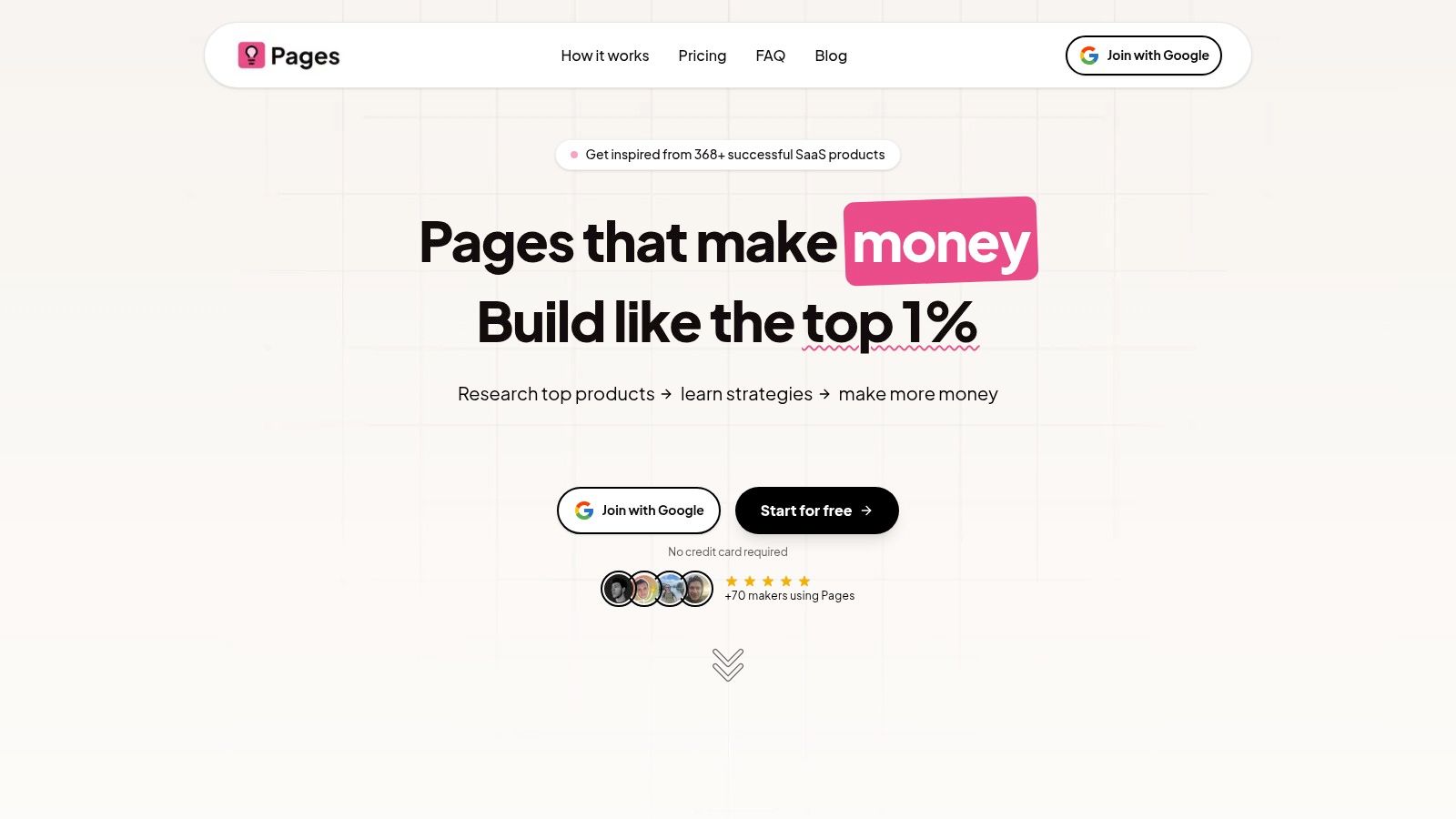
Key Features and Strategic Advantages
- Deep Competitive Analysis: Uncover the design, copy, and SEO tactics that top-performing competitors use. This granular detail helps you understand the why behind their success, not just the what.
- Actionable Resources: The platform provides Figma-ready designs and proven headline formulas, bridging the gap between insight and implementation. This significantly accelerates your A/B testing and design sprints.
- Continuous Updates: With over 50 new landing page reports added weekly, the content remains fresh and aligned with current market trends, ensuring your strategies don't become outdated.
Best Use Cases & Implementation Tips
Pages.Report is ideal for early-stage SaaS companies looking to establish a strong market presence or established businesses aiming to refine their conversion funnels. Before a redesign, use the platform to benchmark your current landing page against the best in your niche. Filter by category to identify common patterns and unique differentiators, then use the provided Figma assets to quickly prototype new layouts. This process is also detailed in their guide on effective market research tools for startups, which offers a broader context for competitive analysis.
Pricing and Access
The platform offers an exceptionally accessible one-time payment model. Lifetime access is available for a limited-time price of $29 (down from $79), which includes all future updates and analyses. A free version is also available with no credit card required, allowing you to explore the platform's value proposition firsthand.
| Feature | Details |
|---|---|
| Primary Focus | SaaS Landing Page Optimization & Competitive Analysis |
| Core Offering | Database of 368+ high-converting landing pages with detailed breakdowns. |
| Unique Advantage | Provides Figma-ready assets and actionable insights, not just inspiration. |
| Target Audience | SaaS Founders, Marketers, Product Managers, Designers. |
| Pros | Vast, categorized library; actionable resources; lifetime access with one-time fee. |
| Cons | Niche focus on SaaS may limit utility for B2C/e-commerce; limited slots for free landing page audit offers. |
| Website | Visit Pages.Report |
2. HubSpot – Marketing Hub
HubSpot’s Marketing Hub is a comprehensive, all-in-one platform designed to grow with your startup. It bundles a powerful CRM with a full suite of marketing tools, enabling you to manage everything from email campaigns and landing pages to social media and ad management from a single, unified dashboard. This native integration between its free CRM and paid marketing features is its core strength, preventing the data silos that often plague startups using disparate tools.
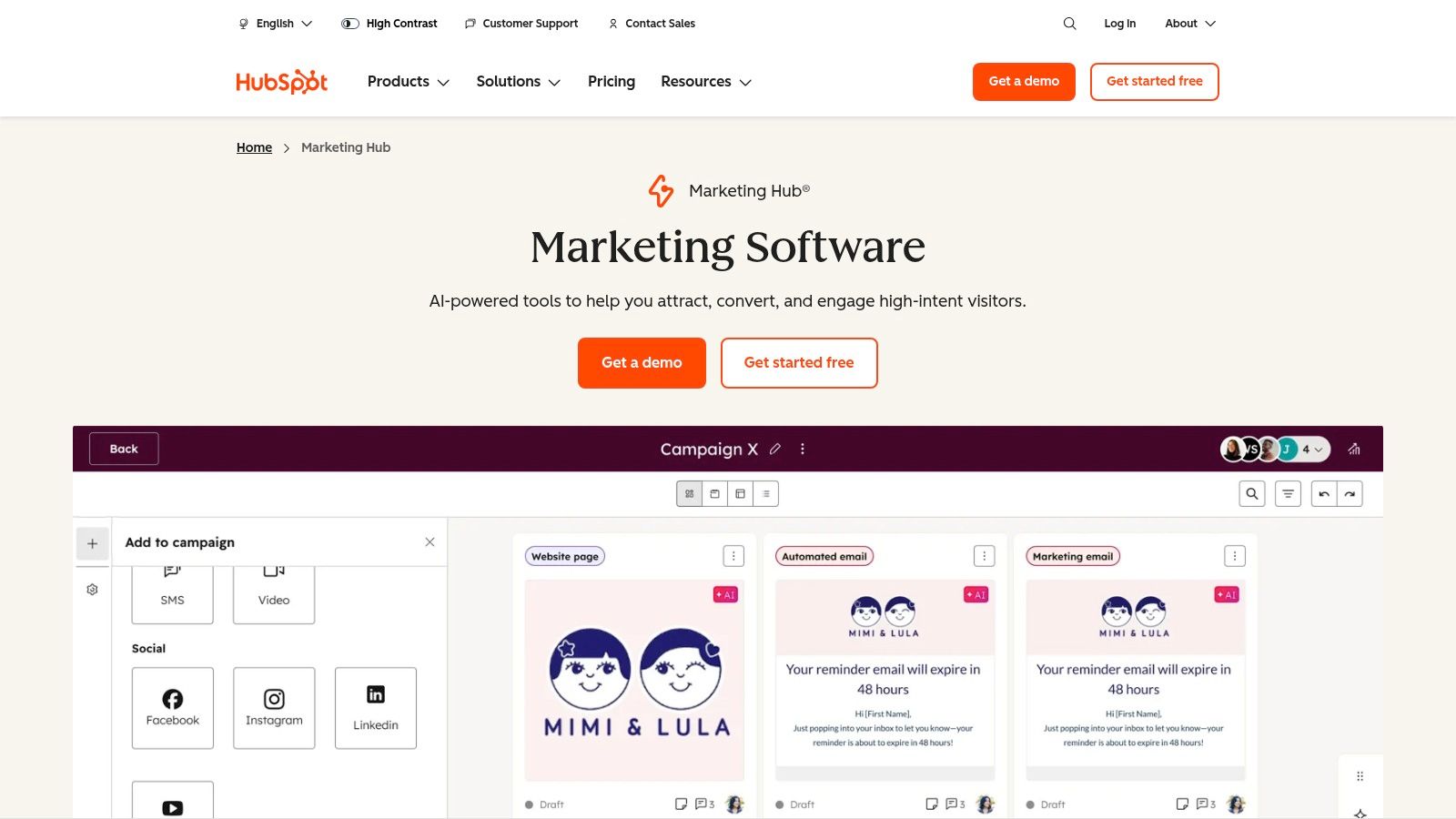
For lean teams, the free tier is remarkably generous, offering basic email marketing, forms, and a CRM to manage up to 1,000,000 contacts. As you scale, you can unlock sophisticated features like visual automation workflows and multi-touch revenue attribution, providing a clear upgrade path without disruptive platform migrations. This makes it an ideal choice among startup marketing tools for businesses anticipating rapid growth.
Key Features & Pricing
| Tier | Key Features | Best For |
|---|---|---|
| Free Tools | Free CRM, email marketing (2,000 sends/mo), forms, landing pages. | Very early-stage startups testing the platform. |
| Starter | Removes HubSpot branding, increases limits, adds simple automation. | Startups needing basic, professional marketing tools. |
| Professional | Visual workflow automation, A/B testing, social media scheduling. | Growing teams focused on scaling lead generation. |
| Enterprise | Multi-touch revenue attribution, custom objects, predictive lead scoring. | Mature startups with complex marketing operations. |
Implementation & Use Case
A common hurdle for startups is aligning sales and marketing. HubSpot solves this by logging every marketing interaction (email open, page view, form submission) directly onto a contact's record in the CRM. A practical use case is creating a "lead nurturing" workflow: a user downloads an ebook from your landing page, is automatically added to the CRM, and receives a series of educational emails over two weeks, all without manual intervention.
Pros:
- Integrated CRM: Eliminates data fragmentation between sales and marketing teams.
- Scalability: A robust free plan and clear tiers support growth from MVP to enterprise.
- Extensive Integrations: A vast marketplace connects with tools like Slack, Zapier, and Stripe.
Cons:
- Pricing Complexity: Costs can escalate quickly based on contact tiers and required add-ons.
- Onboarding Fees: Professional and Enterprise plans often require a significant, mandatory onboarding fee.
Website: https://www.hubspot.com/products/marketing
3. Mailchimp
Mailchimp is one of the most recognizable email marketing platforms, serving as a go-to starting point for countless startups. Its core strength lies in its simplicity and user-friendly interface, allowing founders and non-marketers to launch professional email newsletters and automated campaigns in minutes. While it began with email, it has evolved into an all-in-one platform offering landing pages, social ads, and a basic CRM to manage audience segments.
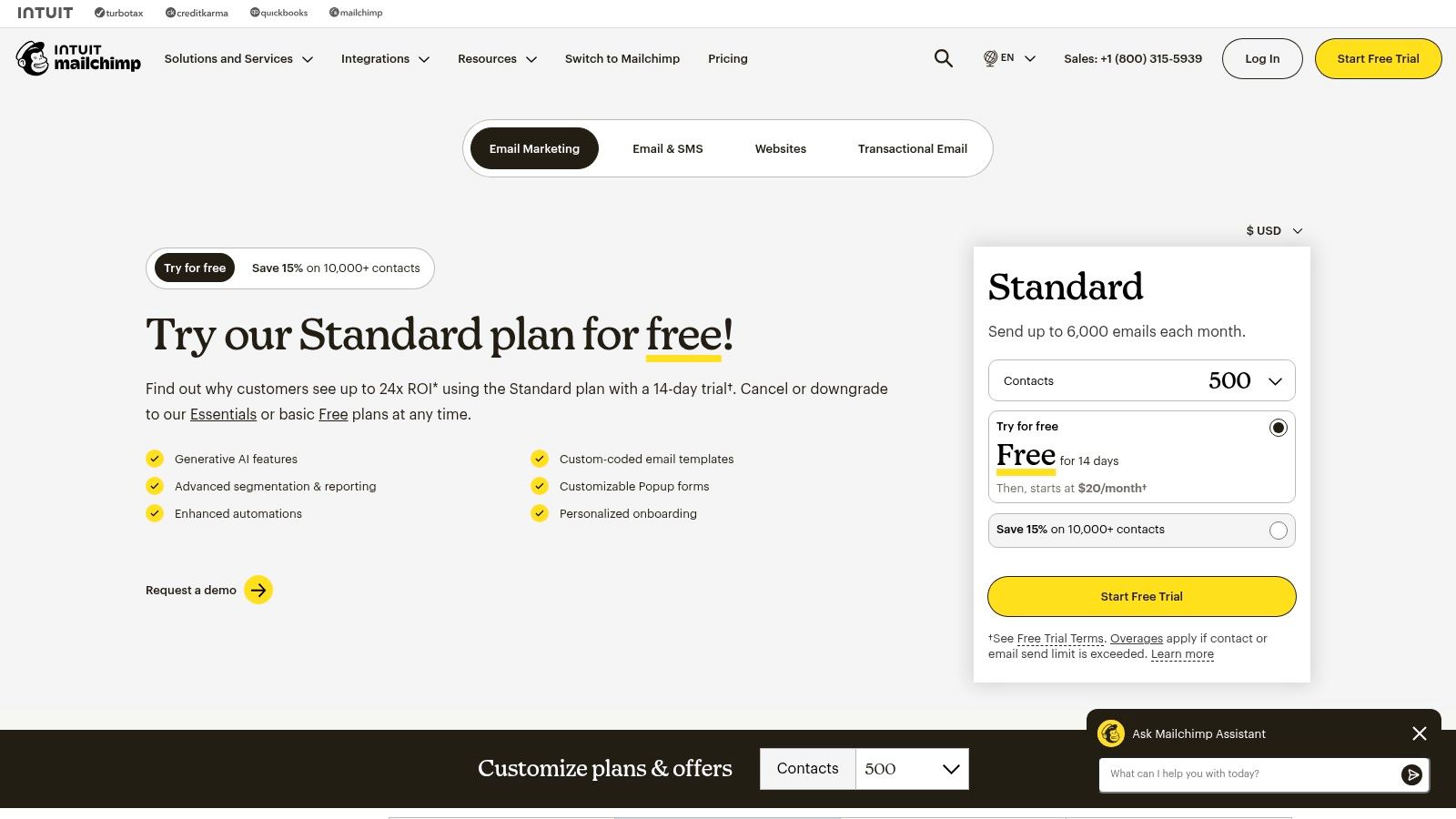
The platform is particularly effective for early-stage companies focused on building an initial audience and nurturing leads through direct communication. Its free tier is generous for new businesses, and the pay-as-you-go credit system provides flexibility for startups that send emails infrequently. This accessibility makes it a foundational tool for establishing a marketing presence without a significant upfront investment.
Key Features & Pricing
| Tier | Key Features | Best For |
|---|---|---|
| Free | Email campaigns, basic templates, CRM for up to 500 contacts. | Solo founders and pre-launch startups building their first list. |
| Essentials | Removes Mailchimp branding, A/B testing, 24/7 email & chat support. | Early-stage startups needing professional, branded communications. |
| Standard | Customer Journey Builder, predictive segmentation, send time optimization. | Growing businesses focused on automating their customer onboarding. |
| Premium | Multivariate testing, advanced segmentation, comparative reporting. | Larger startups with dedicated marketing teams and complex needs. |
Implementation & Use Case
A key challenge for new startups is creating a consistent brand experience from the first interaction. Mailchimp excels here. A practical use case is setting up an automated welcome series using the Customer Journey Builder. When a new user signs up via a form on your website, they can be automatically tagged and entered into a multi-step email sequence. This journey could include a welcome message, a feature highlight, and a call-to-action, ensuring a cohesive first impression. This is a crucial element of many successful customer onboarding strategies.
Pros:
- Ease of Use: An intuitive interface and drag-and-drop editor make it fast to learn and use.
- Excellent Templates: A strong ecosystem of pre-built, mobile-responsive email templates.
- Flexible Pricing: The pay-as-you-go option is ideal for businesses with inconsistent sending needs.
Cons:
- Cost at Scale: Pricing can become expensive as your contact list and sending frequency grow.
- Feature Limitations: The CRM and automation capabilities are less robust than dedicated platforms like HubSpot.
Website: https://mailchimp.com/pricing
4. Semrush
Semrush is an all-in-one digital marketing suite that provides startups with the competitive intelligence needed to win in search. It’s a powerful toolkit for deconstructing competitor strategies in SEO, content marketing, and paid advertising, allowing lean teams to identify and capitalize on market opportunities. Instead of relying on guesswork, startups can use Semrush to find high-intent keywords, analyze backlink profiles, and audit their site for technical SEO issues from a single, integrated platform.
For early-stage companies, its core strength is providing actionable data to drive customer acquisition via organic and paid search. The platform’s ability to track keyword rankings, monitor brand mentions, and discover content gaps makes it an indispensable asset. While there is a learning curve, the depth of its data allows startups to build a sophisticated marketing engine that can scale effectively, making it a cornerstone among foundational startup marketing tools.
Key Features & Pricing
| Tier | Key Features | Best For |
|---|---|---|
| Pro | 5 projects, keyword & domain analytics, 10,000 results per report. | Early-stage startups focused on initial keyword research and competitor analysis. |
| Guru | 15 projects, Content Marketing Toolkit, historical data, Looker Studio integration. | Growing startups needing to scale content and SEO operations. |
| Business | 40 projects, API access, PLA analytics, share of voice metrics. | Established startups with dedicated marketing teams and complex SEO needs. |
Implementation & Use Case
A critical task for any startup is carving out a niche in a crowded market. Semrush directly supports this by revealing what’s working for competitors. A practical use case is using the "Keyword Gap" tool: enter your domain and up to four competitor domains to instantly see which valuable keywords they rank for that you don't. This intelligence can directly inform your content strategy, helping you create targeted blog posts or landing pages to capture qualified traffic.
Pros:
- All-in-one toolkit: Reduces the need for multiple, disparate SEO tools.
- Data depth: Offers extensive data to benchmark against competitors and inform strategy.
- Scalable licensing: User plans can be adjusted as your marketing team grows.
Cons:
- Steeper learning curve: The sheer volume of tools and data can be overwhelming for beginners.
- Expensive for small budgets: The entry-level pricing can be a significant investment for bootstrapped startups.
Website: https://www.semrush.com
5. Ahrefs
Ahrefs is a leading SEO platform that provides startups with in-depth backlink analysis and keyword research. Its extensive link index and historical backlink data help teams uncover organic growth opportunities and monitor competitive landscapes. The intuitive interface and regular platform updates make it a top choice among startup marketing tools.
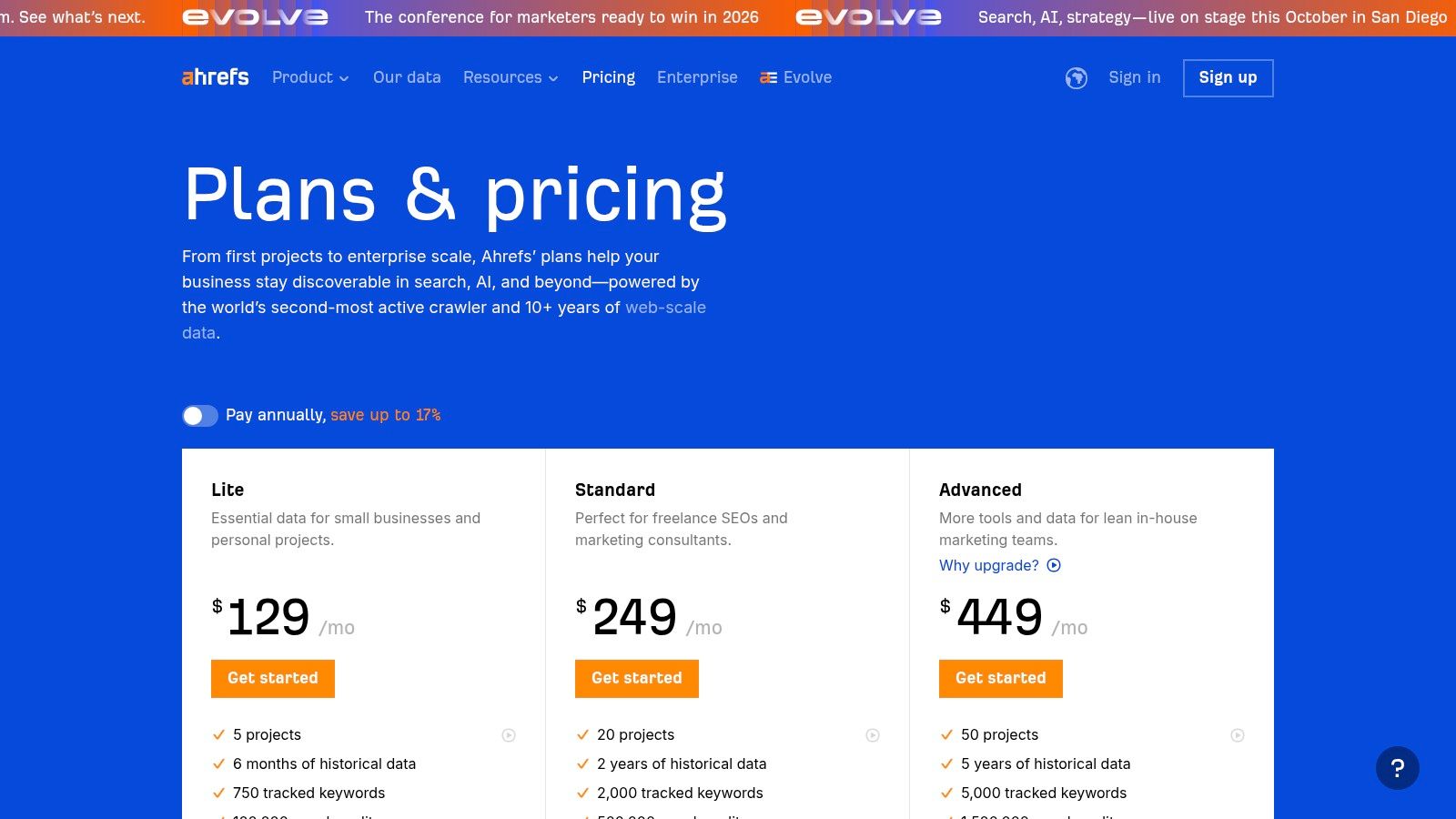
The platform combines five core tools in every plan. Site Explorer, Keywords Explorer, Site Audit, Rank Tracker, and Content Explorer cover all stages of an SEO campaign. Optional add-ons include AI content assistance and a custom report builder for advanced agencies.
Key Features & Pricing
| Tier | Key Features | Best For |
|---|---|---|
| Lite | Site Explorer, Keywords Explorer (limited), Site Audit, 500 tracked keywords | Early stage startups testing SEO |
| Standard | Full keyword data, 1,500 tracked keywords, 1 campaign project | Small teams scaling organic search |
| Advanced | Historical backlink depth, 5 campaigns, API access (add-on), 100,000 crawls/mo | Agencies and rapidly growing startups |
| Enterprise | 10 campaigns, custom dashboards, extended report limits | Enterprises with complex SEO operations |
Implementation & Use Case
A common workflow begins with competitor backlink gap analysis in Site Explorer. Startups export rival link profiles, identify high-authority domains, then launch outreach campaigns to secure placements. Meanwhile, Site Audit runs scheduled scans to flag crawl errors and duplicate content, enabling rapid technical fixes that boost ranking velocity.
Pros:
- Outstanding backlink and keyword data accuracy
- Generous export and crawl limits at higher tiers
- Free Webmaster Tools for basic site audits
Cons:
- Steep pricing jumps between tiers
- Daily rank updates require premium add-on
- API access incurs extra fees
Website: https://ahrefs.com/pricing
6. Canva
Canva has become the go-to design platform for startups that need to produce high-quality marketing assets without a dedicated design team. It empowers anyone to create professional social media graphics, ad creatives, pitch decks, and infographics using an intuitive drag-and-drop interface. Its core value for lean teams is speed, transforming what once took hours in complex software into a task of minutes.
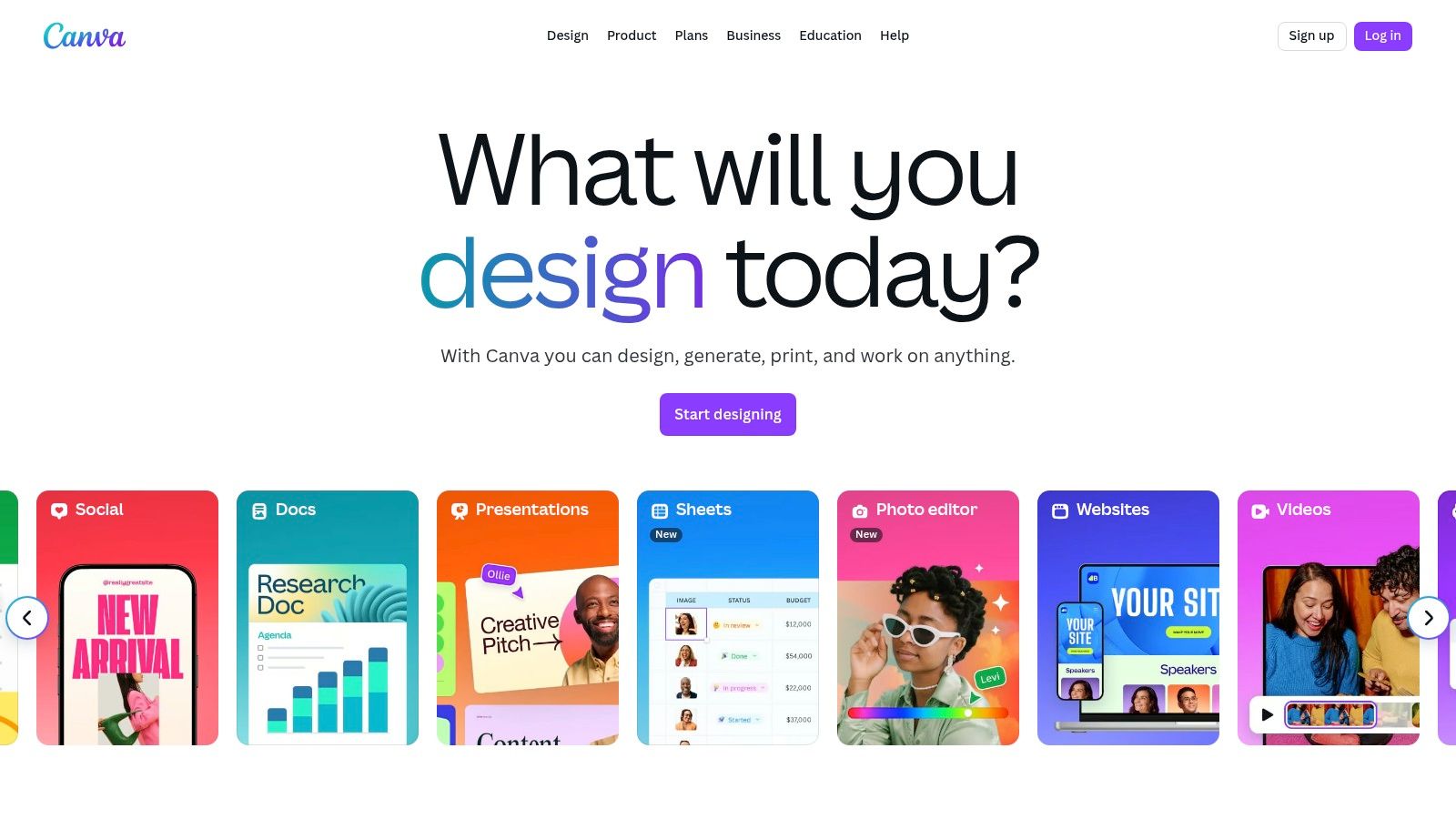
The platform’s massive library of templates ensures that even non-designers can start with a polished foundation, while the Brand Kit feature allows startups to maintain visual consistency by storing logos, color palettes, and fonts. For startups needing a versatile and accessible design solution, Canva is an indispensable part of their startup marketing tools, democratizing creative production for fast-moving teams.
Key Features & Pricing
| Tier | Key Features | Best For |
|---|---|---|
| Free | Thousands of free templates, photos, and fonts. | Individual founders or freelancers creating basic assets. |
| Pro | Brand Kit, background remover, premium stock assets, Magic Resize. | Solo marketers or small teams needing consistent branding. |
| Teams | Real-time collaboration, approval workflows, brand controls, team reports. | Growing startups needing to manage brand assets and content across a team. |
Implementation & Use Case
A critical early-stage task is creating a consistent brand presence across all channels. With Canva, a startup can establish its Brand Kit once and apply it universally. A practical use case involves a content marketer creating a blog post graphic. They can then use the Magic Resize feature to instantly adapt that design into optimal dimensions for LinkedIn, Twitter, and Instagram stories, ensuring a cohesive and professional look everywhere without redundant work.
Pros:
- Rapid Creative Output: Enables non-designers to produce marketing assets quickly.
- Vast Template Library: A massive collection of templates and stock assets accelerates design.
- Collaboration Features: Teams plan allows for streamlined feedback and approval workflows.
Cons:
- Evolving Pricing: Per-seat policies and plan changes have caused user friction.
- Service Reliability: Users have occasionally reported service outages during peak times.
Website: https://www.canva.com
7. Buffer
Buffer is a streamlined and intuitive social media management tool designed for startups that prioritize simplicity and efficiency. It strips away the complexity of enterprise-level platforms, focusing on core functionalities like planning, scheduling, and analyzing social media content. This straightforward approach allows lean marketing teams to establish a consistent and professional presence across multiple channels without a steep learning curve or significant budget commitment, making it a staple among foundational startup marketing tools.
Its strength lies in its clean user interface and transparent pricing model. Startups can start with a generous free plan to manage up to three channels and schedule ten posts per channel, then scale affordably as their needs grow. The platform's built-in AI assistant helps generate ideas and rephrase copy, saving valuable time for busy founders. This focus on essential, easy-to-use features ensures teams spend more time creating content and less time navigating software.
Key Features & Pricing
| Tier | Key Features | Best For |
|---|---|---|
| Free | 3 channels, 10 scheduled posts/channel, AI Assistant. | Solo founders or very early-stage startups building an initial presence. |
| Essentials | Unlimited channels, 2,000 scheduled posts/channel, engagement tools. | Startups actively managing multiple social channels and engaging with their audience. |
| Team | Unlimited users, custom access & permissions, draft collaboration tools. | Small marketing teams needing to collaborate on social media content. |
| Agency | Agency-friendly pricing, custom branding, streamlined client management. | Startups or agencies managing social media for multiple clients. |
Implementation & Use Case
A common challenge for startups is maintaining a consistent posting cadence across platforms like LinkedIn, X (formerly Twitter), and Instagram. Buffer solves this directly with its content calendar and queue system. A practical use case is to "batch create" a week's worth of content on Monday, add it to the Buffer queue with a predefined schedule (e.g., 9 AM, 1 PM, 5 PM daily), and let the tool publish everything automatically. This "set it and forget it" workflow frees up the team to focus on other growth activities.
Pros:
- Transparent Pricing: Simple, affordable per-channel pricing with an excellent free tier.
- Ease of Use: A clean interface and intuitive workflow make onboarding fast for small teams.
- Reliable Scheduling: A core focus on reliable post scheduling and baseline analytics for tracking growth.
Cons:
- Lighter Feature Set: Lacks the advanced social listening and competitor analysis of enterprise suites.
- Plan-Gated Features: Advanced reporting and team permissions are reserved for higher-priced plans.
Website: https://buffer.com/pricing
8. Google Ads
Google Ads is the definitive platform for capturing high-intent search traffic, allowing startups to place their product or service directly in front of customers at the exact moment they are looking for a solution. Its strength lies in its massive reach across Search, YouTube, Display, and Maps, providing an unparalleled ability to test messaging, drive targeted signups, and generate immediate sales with a fully controllable and measurable budget.
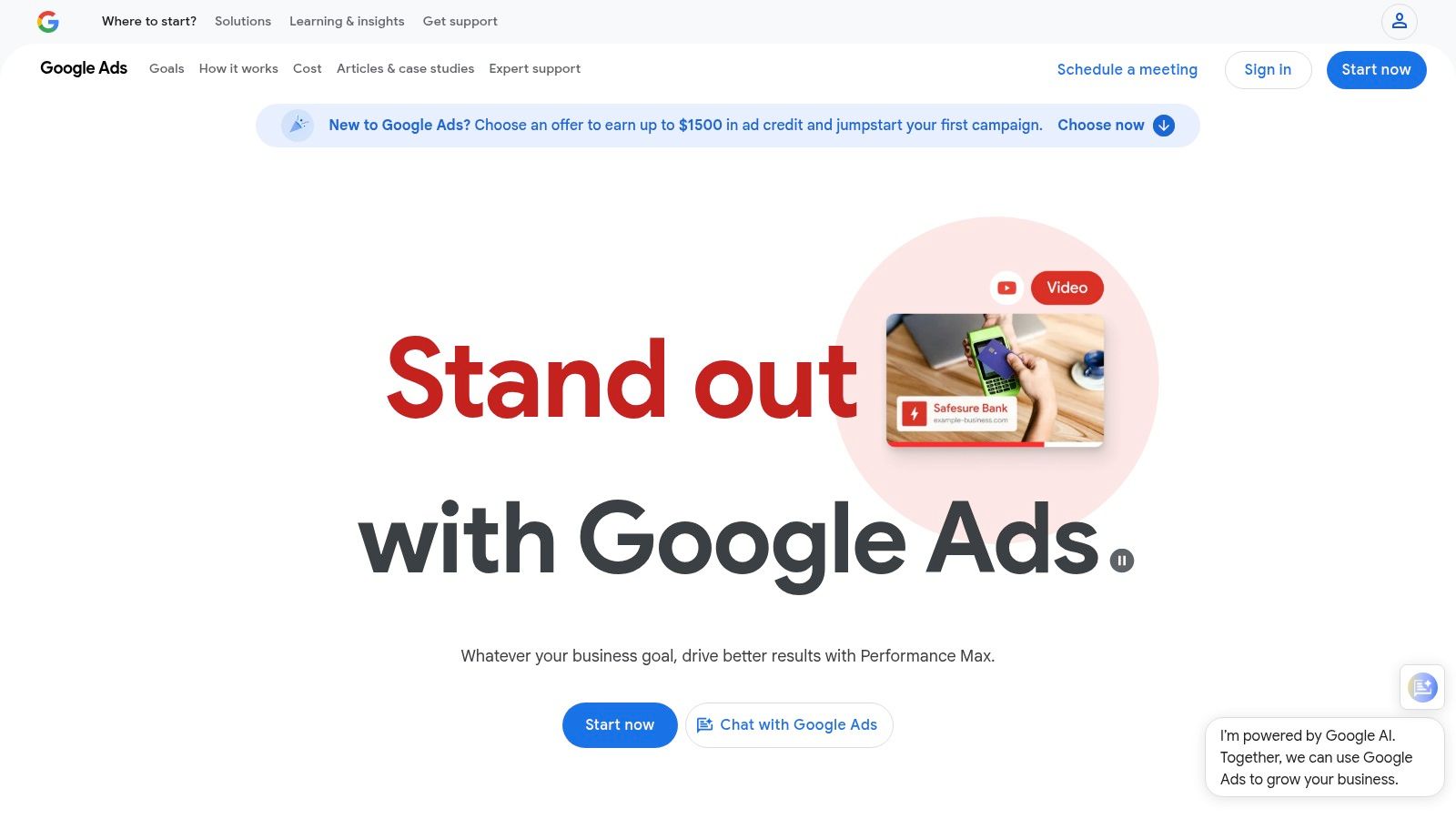
For startups, Google Ads serves as a powerful market validation and customer acquisition engine. It moves beyond brand awareness and directly targets commercial intent, making it one of the most performance-driven startup marketing tools available. The platform’s pay-per-click (PPC) model ensures that you only pay when a potential customer takes action, offering a clear and direct return on ad spend that is crucial for lean budgets.
Key Features & Pricing
| Tier | Key Features | Best For |
|---|---|---|
| Search Campaigns | Text-based ads on Google Search results pages. | Startups targeting users with high commercial intent. |
| Performance Max | Automated, goal-based campaigns across all Google channels. | Teams seeking maximum reach with minimal manual optimization. |
| Video Campaigns | Video ads on YouTube and Google's video partner network. | Startups focused on brand storytelling and product demos. |
| Display Campaigns | Visual banner ads across a network of over 2 million websites. | Building brand awareness and retargeting website visitors. |
Implementation & Use Case
A critical early challenge for startups is acquiring the first cohort of paying customers. Google Ads addresses this by targeting specific keywords related to the problem your product solves. A practical use case is a SaaS startup bidding on "small business invoicing software." They can set up a campaign to show ads only to users searching that term, directing them to a dedicated landing page. By implementing conversion tracking, the startup can measure exactly how many signups the campaign generates, calculating a precise cost-per-acquisition (CPA). For even better results, you can explore some conversion rate optimization tips to improve your landing page performance.
Pros:
- Immediate High-Intent Traffic: Access potential customers actively searching for your solution.
- Granular Targeting: Refine audiences by keyword, location, demographics, and behavior.
- Flexible Budgeting: Set strict daily or monthly spend limits with no minimum commitment.
Cons:
- High Competition: Popular keywords can have a very high cost-per-click (CPC), making some verticals expensive.
- Steep Learning Curve: Requires experimentation and knowledge to avoid wasting ad spend on a poor account structure.
Website: https://ads.google.com
9. Meta Ads Manager
Meta Ads Manager is the indispensable self-serve advertising platform for startups aiming to reach massive audiences quickly across Facebook, Instagram, Messenger, and the Audience Network. Its power lies in its unparalleled targeting capabilities, allowing marketers to find niche customer segments based on detailed demographics, interests, and behaviors. This makes it a go-to platform for validating product-market fit and driving initial user acquisition.
For startups, the key differentiator is the ability to rapidly test creative formats like Reels and Stories against lookalike audiences, which are algorithmically generated segments of users similar to a startup's best customers. While its interface can be complex, its objective-based campaign structure guides advertisers toward specific goals, from brand awareness to direct conversions, making it a highly effective, if sometimes challenging, addition to any startup's marketing tools.
Key Features & Pricing
| Tier | Key Features | Best For |
|---|---|---|
| No Tiers | Objective-based campaigns, detailed audience targeting, Lookalike Audiences, Pixel & Conversions API tracking, creative A/B testing. | Startups of all stages needing to drive awareness, leads, or sales via paid social media. |
| Flexible Budget | Set daily or lifetime budgets, with options for monthly billing or payment thresholds. Cost is based on auction dynamics (CPM/CPC). | Teams that require full control over ad spend, from small-scale tests to large-scale growth campaigns. |
Implementation & Use Case
A critical hurdle for B2C startups is cost-effective customer acquisition. Meta Ads excels here. A practical use case is launching a campaign for a new mobile app: first, install the Meta Pixel and Conversions API to track app installs. Next, run an initial "Traffic" campaign to a broad audience to gather data. Once you have 100+ installs, create a "Lookalike Audience" based on those users and launch a new "App Installs" campaign targeting this high-intent segment with a compelling video ad, significantly improving your cost-per-install.
Pros:
- Extensive Reach: Access to billions of daily active users across multiple platforms.
- Powerful Retargeting: Sophisticated options to re-engage website visitors and past customers.
- Rapid A/B Testing: Easily test different ad creatives, copy, and audiences to find what works.
Cons:
- Account Instability: Ad accounts can be flagged or suspended, disrupting campaigns with variable support.
- Signal Dependency: Performance is highly sensitive to data quality from the Pixel/API and impacted by privacy changes.
Website: https://www.facebook.com/business/ads
10. AppSumo
AppSumo is a marketplace for entrepreneurs to discover, buy, and sell software products, with a heavy focus on lifetime deals (LTDs). For startups operating on a tight budget, it offers an unparalleled opportunity to build a powerful marketing stack for a fraction of the typical monthly SaaS cost. By curating deals on emerging and established tools for SEO, content creation, social media, and lead generation, it helps founders test different solutions without committing to expensive recurring subscriptions.
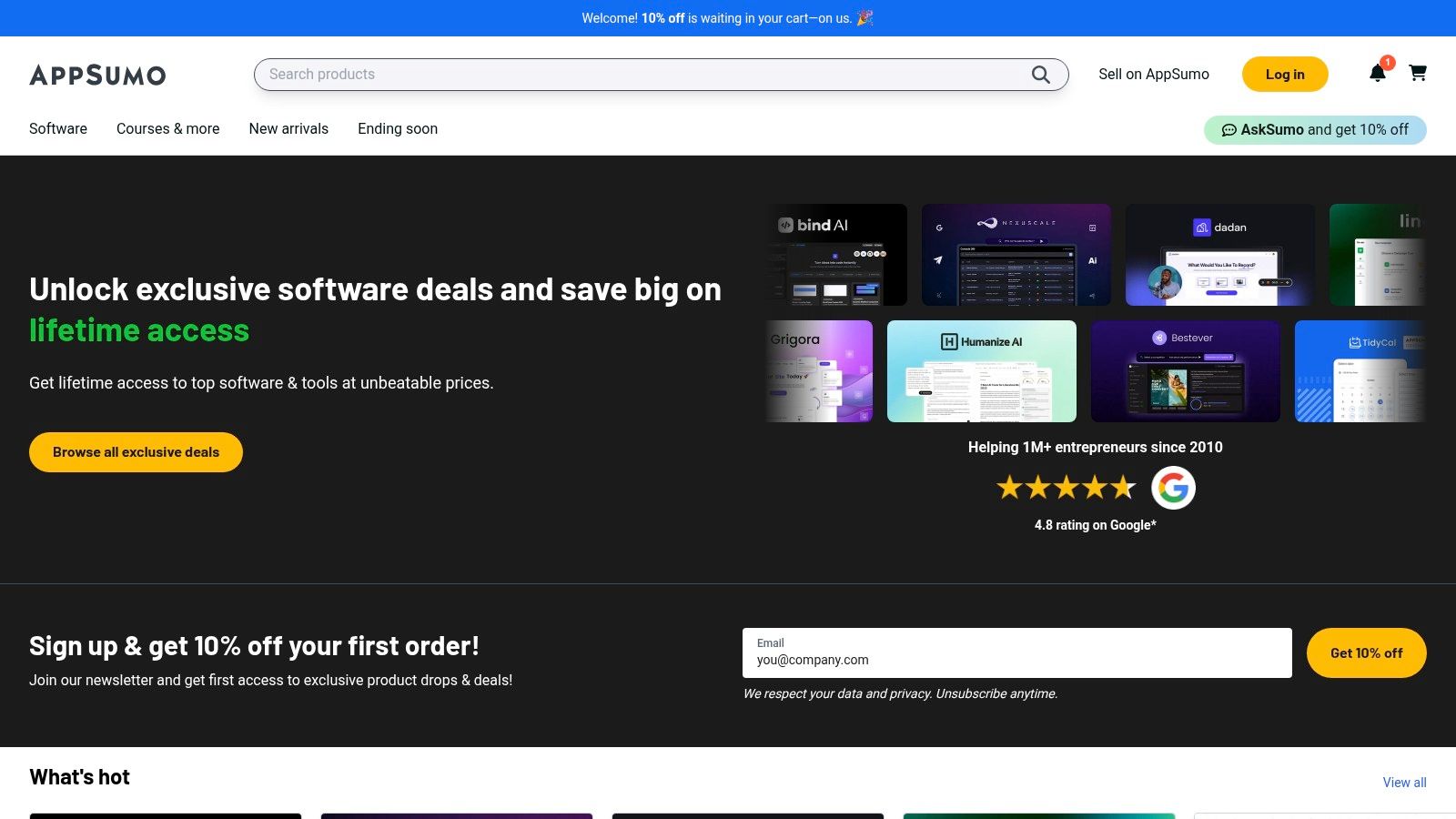
The platform's value proposition is simple: pay once and own the software license forever. However, this model requires careful vetting. While many deals are from promising new companies, others may be from less stable vendors. The robust community review system is crucial for evaluating a tool's long-term viability and the quality of its support before purchasing. This makes it a high-reward, medium-risk source for essential startup marketing tools.
Key Features & Pricing
| Tier | Key Features | Best For |
|---|---|---|
| Standard Deals | Rotating catalog of lifetime and annual deals on various software. | Startups testing new tools or filling a specific gap in their stack. |
| AppSumo Select | Curated deals from vetted partners with enhanced return policies. | Teams wanting higher confidence in the longevity of their purchased tools. |
| Plus Membership | 10% off purchases, early/late access to deals, and exclusive software. | Frequent buyers who want to maximize savings and access. |
Implementation & Use Case
A common challenge for early-stage startups is affording specialized tools for tasks like video creation or AI-powered copywriting. A practical use case is acquiring an LTD for a social media scheduling tool. Instead of paying $50/month, a startup might pay a one-time fee of $59 on AppSumo for similar functionality. This immediately frees up monthly cash flow that can be reallocated to ad spend or other growth initiatives. The key is to act fast on good deals and thoroughly read user reviews.
Pros:
- Significant Cost Savings: One-time payments dramatically reduce a startup's monthly burn rate.
- Tool Discovery: Exposes teams to innovative and niche tools they might not find otherwise.
- Community Vetting: User reviews provide real-world insights into a product's stability and support.
Cons:
- Vendor Longevity Risk: Some lifetime deals come from unproven companies that may shut down.
- Variable Quality: The quality of tools and customer support can vary significantly between deals.
Website: https://appsumo.com
11. Shopify App Store – Marketing Apps
Shopify App Store’s Marketing Apps section functions as a central marketplace for startups selling online with Shopify. It offers a curated catalog of email and SMS solutions, SEO optimizers, user review platforms, referral engines, and ads channel integrations. Tight integration with Shopify admin and customer data ensures campaigns reflect real store activity instantly.
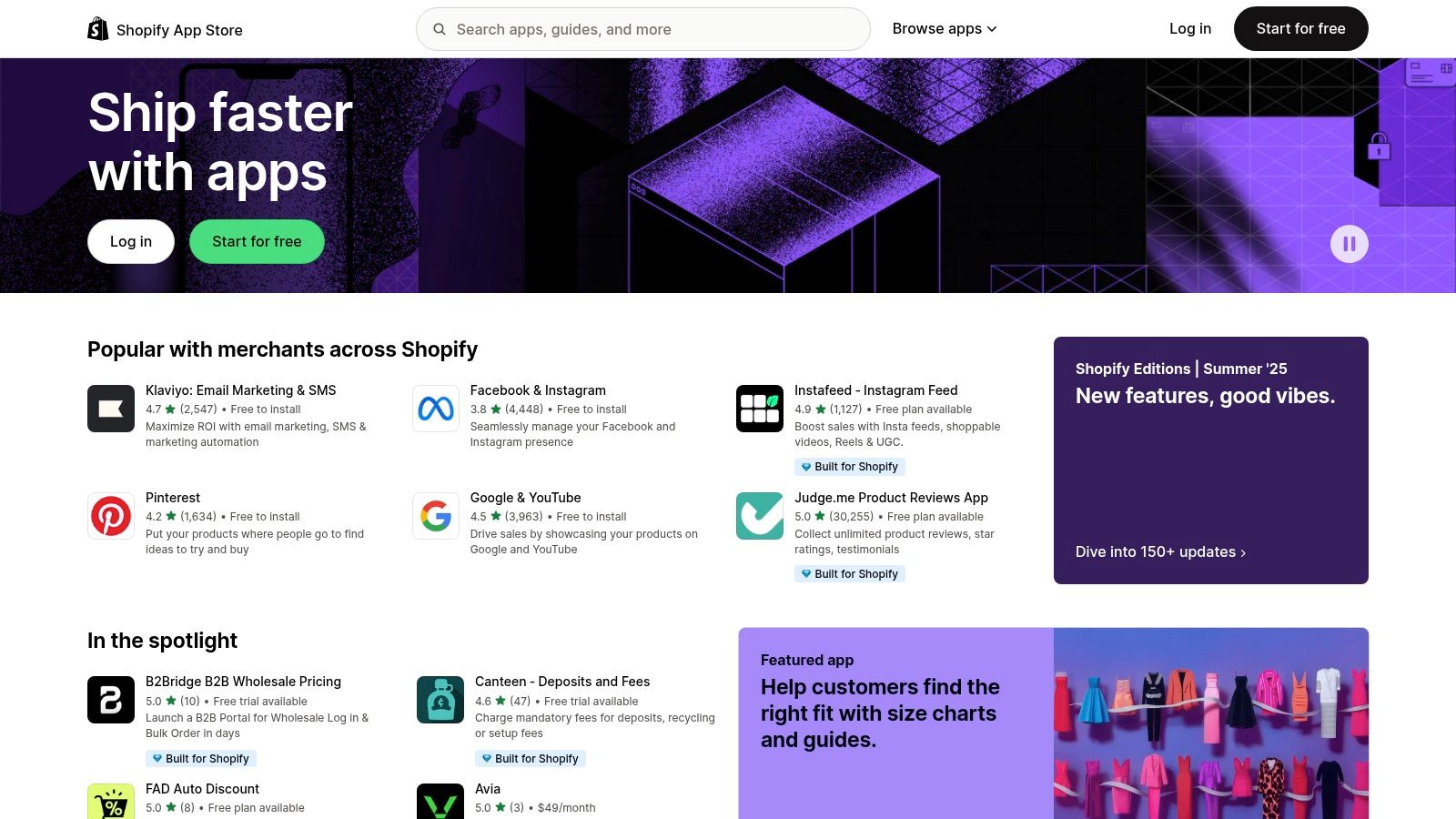
Key Features & Pricing
| Tier | Key Features | Best For |
|---|---|---|
| Free to Browse | Curated free email, SEO, reviews and UGC apps, built-in Shopify integration | Very early-stage stores validating tools |
| Paid One-Time | Single-purchase marketing widgets, referral and UGC modules | Indie makers needing specific functionality |
| Subscription | Monthly or annual apps including SMS, automation and ads channels | Growth-stage startups requiring scalable features |
Implementation & Use Case
A common challenge for Shopify startups is choosing compatible marketing apps without breaking the budget. By filtering “Built for Shopify” apps and reading quality indicators, you can install email workflows or Google Ads integrations with one click. Unified billing keeps monthly costs consolidated under your Shopify invoice. For example, a team might add a post-purchase SMS app to automate review requests, driving UGC and social proof without manual outreach.
Pros:
- One-click installs and unified billing under a single invoice
- Wide choice across categories to fit various budgets
- Official channel apps (Meta, Google, TikTok) simplify setup
Cons:
- Risk of app sprawl increasing monthly fees
- Discovery can be noisy; requires careful vetting
- Individual app support varies by developer
Website: https://apps.shopify.com
12. G2 – Marketing Software Categories
Instead of a single tool, G2 is a comprehensive B2B software marketplace that acts as an essential research hub. For startups, its value lies in the ability to discover, compare, and validate thousands of marketing tools based on verified user reviews. Navigating the crowded martech landscape is a significant challenge, and G2 provides a structured way to shortlist potential solutions, from email and social media management to analytics and conversion rate optimization.
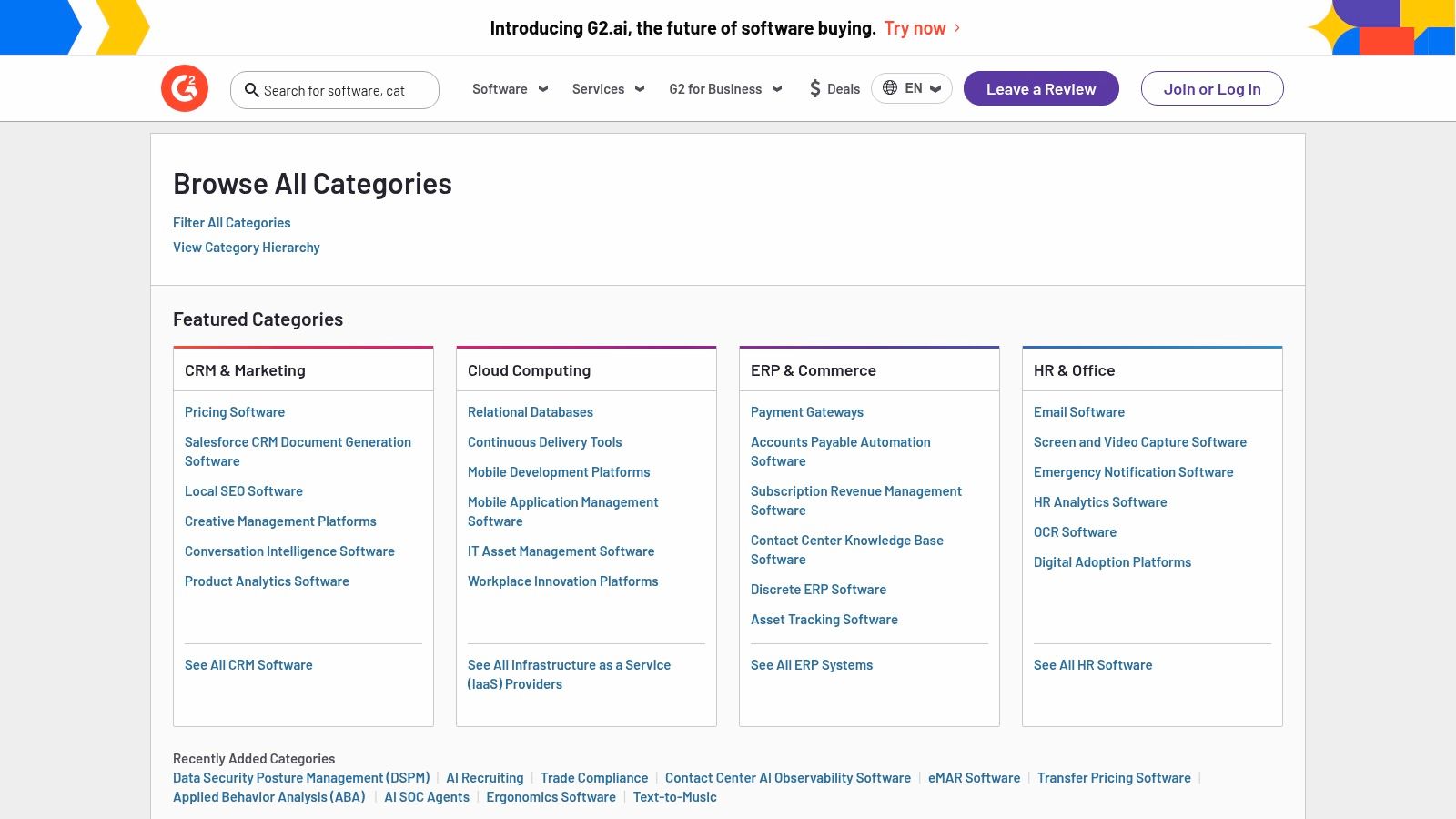
This platform aggregates peer feedback, allowing you to filter options by company size, user satisfaction, and specific features. This helps ensure that the tools you evaluate are a genuine fit for your startup's stage and budget. By leveraging its comparison grids and detailed reviews, you can make more informed purchasing decisions and avoid costly mismatches, making it a crucial first stop in any tool selection process.
Key Features & Pricing
| Feature | Description | Best For |
|---|---|---|
| Software Categories | Dozens of marketing-related categories and comparison grids. | Discovering tools for a specific need (e.g., "SEO Tools"). |
| Advanced Filtering | Filter results by company size, features, user ratings, and pricing models. | Narrowing down choices to find tools suitable for a startup. |
| Verified Reviews | Aggregated user feedback with scores for ease of use, support, and ROI. | Validating a tool's real-world performance before committing. |
| Comparison Grids | Side-by-side tool comparisons based on user satisfaction and market presence. | Quickly shortlisting the top 2-3 contenders in a category. |
Implementation & Use Case
G2 is not a tool to implement but a resource to guide implementation. A practical use case for a startup looking for project management software would be to navigate to the "Project Management" category, filter for companies with "1-50 employees," and sort by "Highest Rated." You can then read in-depth reviews from users at similarly-sized companies, identify common pros and cons, and use the direct links to start free trials with the top three candidates.
Pros:
- Side-by-Side Comparisons: Invaluable for quickly shortlisting and evaluating alternatives.
- Authentic User Feedback: Provides insights into a tool’s actual performance and support quality.
- Comprehensive Coverage: Includes both major platforms and emerging niche startup marketing tools.
Cons:
- Incentivized Reviews: Some reviews may be influenced by vendor incentives, requiring critical reading.
- Outdated Information: Pricing and feature details can occasionally lag behind the vendor's official site.
Website: https://www.g2.com/categories
Top 12 Startup Marketing Tools Comparison
| Product | Core Features / Insights ✨ | User Experience / Quality ★ | Value Proposition 💰 | Target Audience 👥 | Unique Selling Points 🏆 | Price Points 💰 |
|---|---|---|---|---|---|---|
| Pages.Report 🏆 | 368+ SaaS landing pages, Figma-ready designs, SEO | Data-driven insights, weekly updates | One-time $29 lifetime access, free audits | SaaS startups, marketers, PMs | Proven SaaS patterns, detailed reports | ★★★★★ / $29 one-time |
| HubSpot – Marketing Hub | Email, landing pages, ads, CRM, automation | Robust reporting, smooth scaling | Free tier, tiered pricing | Startups to growing teams | Native CRM integration, automation | ★★★★ / Contact tier pricing |
| Mailchimp | Email campaigns, basic CRM, landing pages | Easy UI, fast setup | Free tier with limits | Small teams, early-stage growth | Templates, pay-as-you-go option | ★★★ / Free + add-ons |
| Semrush | SEO/SEM suite, keyword research, site audits | Deep data, competitive benchmarking | All-in-one SEO tool suite | Marketers, SEO specialists | Extensive SEO features | ★★★★ / Mid to high-tier price |
| Ahrefs | SEO tools, backlinks, site audit | High data quality, exports | Tiered plans with generous exports | Startups focusing on SEO | Best backlink/keyword data | ★★★★ / Mid to high-tier price |
| Canva | Design templates, AI tools, team collaboration | Fast creative output | Free tier + paid plans | Early stage teams, marketers | AI-assisted design, brand kits | ★★★★ / Free + per-seat plans |
| Buffer | Social media scheduling, analytics | Simple, reliable scheduling | Transparent per-channel pricing | Startups needing social management | Easy onboarding, baseline analytics | ★★★ / Low to mid pricing |
| Google Ads | PPC, multi-network campaigns, automated bidding | Granular targeting, detailed reporting | Pay-per-click, flexible budgets | Startups testing paid acquisition | High-intent traffic, cross-network reach | ★★★★ / Variable spend |
| Meta Ads Manager | Multi-channel ads, detailed targeting | Fast A/B testing, creative formats | Flexible billing | Startups leveraging social ads | Powerful retargeting and formats | ★★★★ / Variable spend |
| AppSumo | Discounted SaaS deals, marketplace | Variable experiences | Deep discounts on lifetime deals | Budget-conscious startups | Exclusive lifetime deals | ★★★ / Varies per deal |
| Shopify App Store | Marketing app marketplace for Shopify | App reviews, curated collections | Wide budget range apps | Shopify stores, e-commerce startups | Seamless Shopify integration | ★★★★ / Varies by app |
| G2 – Marketing Software | Review site for marketing software | Aggregated user feedback | Free access to reviews & comparisons | B2B buyers, decision makers | Large category coverage, user ratings | ★★★ / Free |
Building Your Stack, Building Your Business
Navigating the landscape of startup marketing tools can feel overwhelming, but building your perfect stack doesn't have to be a monumental task. The 12 platforms we've explored, from comprehensive CRMs like HubSpot to specialized SEO powerhouses like Semrush and Ahrefs, represent the foundational pillars of a modern marketing strategy: acquisition, engagement, conversion, and analysis. Each tool offers a unique lever to pull, whether you're crafting compelling visuals with Canva, automating social media with Buffer, or driving targeted traffic with Google and Meta Ads.
The most crucial takeaway is that the "perfect" marketing stack is not a one-size-fits-all solution. It's a dynamic, evolving system tailored to your startup's specific stage, goals, and budget. The right toolset acts as a force multiplier, automating repetitive tasks, providing critical data insights, and freeing up your most valuable resource: your team's time.
From List to Action: How to Choose Your Tools
So, where do you go from here? The key is to move from passive reading to active implementation. Don't try to adopt all twelve tools at once. Instead, use a strategic approach to build a stack that grows with you.
-
Identify Your Biggest Bottleneck: What is the single biggest challenge holding your growth back right now? Is it lead generation? Content creation? SEO visibility? Start with the tool that directly addresses your most pressing pain point. If you have no traffic, a tool like Semrush is a better starting point than a complex CRM.
-
Prioritize by Business Stage: An early-stage, pre-product-market-fit startup has vastly different needs than one that is scaling rapidly. Leverage free tiers and low-cost entry points from tools like Mailchimp and Buffer. Marketplaces like AppSumo are invaluable for discovering lifetime deals that can save thousands in the long run.
-
Focus on Integration and Workflow: The best tools don't operate in a vacuum; they connect seamlessly to create a cohesive workflow. Before committing, consider how a new tool will integrate with your existing systems. A well-integrated stack prevents data silos and ensures a smooth flow of information, from a visitor's first click on an ad to their eventual conversion.
-
Embrace a "Test and Iterate" Mindset: Your first choice might not be your final one. Most SaaS tools offer free trials for a reason. Use them to their full potential. Run a pilot project, get your team's feedback, and assess the tool's real-world impact on your key metrics before committing to an annual plan. Don't be afraid to switch platforms if one isn't delivering the expected ROI.
Your Stack is Your Strategy's Engine
Ultimately, the collection of startup marketing tools you assemble is more than just software; it's the operational engine that powers your growth strategy. They provide the structure for your campaigns, the data for your decisions, and the automation for your scale.
By starting lean, focusing on your most critical needs, and continuously re-evaluating your stack, you empower your team to work smarter, not harder. You transform abstract goals into measurable outcomes. The right combination of technology won't build the business for you, but it will give you the leverage, insight, and efficiency needed to compete and win.
Ready to get a crystal-clear view of how your marketing efforts are performing? Start with the foundation: your website's performance. Pages.Report offers deep, actionable insights into your site's SEO, speed, and overall health, helping you identify the critical issues that other tools miss. Sign up for a free analysis at Pages.Report and turn your website into a true growth engine.
